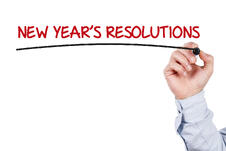 Happy New Year!
Happy New Year!
2014 is promising to be a busy year with critical projects such as the ICD10 conversion. Here are 5 resolutions that will help you have a prosperous year.
1. Commit to learning
It is easy to get caught up under an overwhelming volume of requests and neglect to take time to learn new tools, new data models, new workflows, or new business concepts. But you need to take time to equip yourself with new knowledge that will help you become more effective. You might have mastered various reporting tools already. You can now delve into business intelligence systems. Stay sharp.
2. Share your knowledge
As you discover new things, share them. This is not a "flip side" of the previous resolution, but a continuation of it. You will find out that whenever you share, you actually learn more in the process. I have conducted several MS Reporting Services training sessions. Each time new questions and technical challenges surfaced and pushed me to learn more. Others have also given me suggestions for better ways of doing things. Find more junior programmers that can benefits from techniques you have been using. Share also beyond your organization. There are new EMR rollout's every year. Your lessons learned could be a life saver for someone else.
3. Get out more
Do not get too comfortable at your desk. Of course, we all need to block time to focus on development at times. But it is critical to leave your IT dungeon and meet your requesters to nurture a professional relationship with them. Understanding their business better will help you with creating reports that will give them the right insight. You will also find out that they will be more willing to work with you when a project goes wrong or is delayed. That's a side benefit worth having.
4. Document more
Comment your code. Document requirements. Capture validation notes. Keep track of changes and their justification. Documentation seems to be a tedious task when other requests are demanding our attention. But, it is not an ungrateful task. Document well and it will save you time when you need to troubleshoot that report you wrote 6 months ago. Or you might come back from vacation only to face a crisis that could have been avoided if someone else could have had clarity about what you developed. Don't view documentation as a separate task. Just expect your work to be documented, otherwise it is not complete.
5. Manage expectations
Let's face it: we all have much to do and inevitably run into conflicting priorities and might not be able to meet deadlines. Don't be surprised when that happens. In fact, expect that it will be difficult to deliver everything on time and take time to assess your work. Determine what can be cancelled, what can be delayed, what might need help from others, and what you might have to work extra for. The evaluation need not be detailed because it is not about figuring out every aspect of your requests. You just need to have a good enough understanding of your workload to estimate the number of hours needed for each item and its relative importance. But the key to managing expectations, is to win the communication game. Evaluate your work early so that you can raise red flags early if need be. This habit will demonstrate that you own your work and are in control. But the real benefit is that it will decrease your stress level significantly.